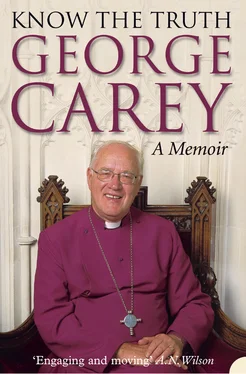George Carey - Know the Truth
Здесь есть возможность читать онлайн «George Carey - Know the Truth» — ознакомительный отрывок электронной книги совершенно бесплатно, а после прочтения отрывка купить полную версию. В некоторых случаях можно слушать аудио, скачать через торрент в формате fb2 и присутствует краткое содержание. Жанр: unrecognised, на английском языке. Описание произведения, (предисловие) а так же отзывы посетителей доступны на портале библиотеки ЛибКат.
- Название:Know the Truth
- Автор:
- Жанр:
- Год:неизвестен
- ISBN:нет данных
- Рейтинг книги:3 / 5. Голосов: 1
-
Избранное:Добавить в избранное
- Отзывы:
-
Ваша оценка:
- 60
- 1
- 2
- 3
- 4
- 5
Know the Truth: краткое содержание, описание и аннотация
Предлагаем к чтению аннотацию, описание, краткое содержание или предисловие (зависит от того, что написал сам автор книги «Know the Truth»). Если вы не нашли необходимую информацию о книге — напишите в комментариях, мы постараемся отыскать её.
Know the Truth — читать онлайн ознакомительный отрывок
Ниже представлен текст книги, разбитый по страницам. Система сохранения места последней прочитанной страницы, позволяет с удобством читать онлайн бесплатно книгу «Know the Truth», без необходимости каждый раз заново искать на чём Вы остановились. Поставьте закладку, и сможете в любой момент перейти на страницу, на которой закончили чтение.
Интервал:
Закладка:
First I had to be ordained for this ministry, and a date was fixed for 3 December 1987 at Southwark Cathedral. Up to that point I had not met Robert Runcie, the 102nd Archbishop of Canterbury. From a distance Robert seemed a reserved and lofty figure. He had the reputation in evangelical circles of being wobbly and indecisive on doctrinal and ethical issues, and the only contact I had had with Lambeth Palace as a Principal was distinctly unpromising. An able ordinand had resigned over the statements of David Jenkins, the then Bishop of Durham. As a result I had written to the Archbishop expressing my concern that a Bishop of the Church should express his doubts so freely about the resurrection of Christ. I received what was obviously a standard letter, signed by a staff member, to the effect that David Jenkins’s views did not state the mind of the Church. I was not impressed.
I met Robert for the first time on the evening before my consecration. The convention is for the family of the new Bishop to stay overnight with the Archbishop. Our large family was delighted and excited to accept this kind invitation, and it turned out to be a wonderful occasion. Before dinner Robert and I had a thirty-minute conversation, and my opinion of him changed as we spoke together. I could not fail to notice his evident spirituality, his wry sense of humour and his distinct love of people. But he seemed terribly tired and preoccupied.
The reason for this became apparent during dinner. I was sitting next to Lindy Runcie, whose direct and candid observations on every subject made her an entertaining companion. Looking across at Robert, she suddenly exploded and said, ‘Poor Robert is under such pressure. That wretched man!’ As the adjective was clearly not aimed at her husband, I asked her what she meant. Out poured a great deal of vitriol directed at Dr Gary Bennett, then Chaplain of New College, Oxford, and a leading Anglo-Catholic theologian, who she believed was the author of the Preface to the new edition of Crockford’s Clerical Directory , which by tradition was written anonymously by a prominent cleric. The Preface was critical of Robert’s liberalism, and accused him of packing the House of Bishops full of his cronies. As I was hardly one of these I could barely contain my mirth, but Robert and Lindy were obviously most distressed. This was my first encounter with the demands of the Archbishop’s office and the way criticism could work its way under one’s skin, causing real emotional pain.
The service in Southwark Cathedral the following day lived up to my expectations. Robert led it very well, and Canon Roy Henderson, Chairman of Trinity Council, gave an inspiring address. I had asked the cathedral if the college music group could lead some devotional songs during the offering of communion, and they did so very beautifully indeed.
The press were out in force after the consecration to cover what seemed to be a developing civil war in the Church. Robert was besieged by photographers and cameramen, and journalists clamoured for him to give his view of the damaging Preface, and to offer an opinion about the identity of the author. Of course he declined because it was not the time or place to comment upon such a matter.
If the Preface did originate from Gary Bennett, it was unworthy of a writer of such distinction. As it happened I knew him well, and liked him, although we had clashed ideologically as fellow members of a Commission which had been brought together to examine the theology of the Episcopate, and the Preface’s style was certainly similar to his. It was a commonly held view that Gary was ambitious to be a Bishop, and very bitter towards the two Archbishops, who he felt were blocking his chance of higher office. The story was to end tragically a week later, when Gary committed suicide after having been exposed as the author of the Preface on the front page of the Sun newspaper.
Looking back on that episode, which brought such shame on the Church of England, I doubt very much if there ever was a liberal conspiracy. The Crown Appointments system does not operate like that. Archbishops have considerable but not final influence in deciding which names are put forward for appointment. The truth was possibly more mundane – that the Anglo-Catholic tradition had declined from greatness to a less pivotal position in the Church. Was it any longer able to provide men with the ability and vision needed to lead churches into mission and life? In my judgement it now appeared to be obsessed with issues which were of secondary importance to most members of the Church, such as the ordination of women. It was a tradition in crisis.
What kind of Bishop did I want to be? This question was very much in my mind from the moment the offer had come from the Crown. I spent many hours considering it and praying over it, and two conclusions emerged.
First, all I could offer was myself in all my humanity. I was overcome by the thought of being a Bishop and there was every reason for trepidation. Few people from my kind of background ever came this close to senior office in the Church. With genuine humility I could only offer my unworthiness and weakness, and ask that this sacrifice of love might be pleasing in God’s sight. The day before my consecration as Bishop I had read 2 Chronicles 1, and had written in my private diary the following words: ‘Reading from 2 Chron. 1 this morning the words leapt out: God said “Ask what I shall give you?” Solomon replied: “Wisdom and knowledge to go out and to come in before thy people.” How relevant! I feel I need this too but combined with an unflinching faith in the power of the Gospel and an undying love of God. Only if I truly love Him will I love others.’
Second, I believed I was called to be a Bishop-in-mission. As I considered what was expected of me, I felt dissatisfied with the traditional role of being a Bishop, just as the traditional role of being a clergyman had not satisfied me in Durham. It was assumed that I would pastor clergy, confirm and institute them into new work and generally oversee the work of the diocese. There would certainly be enough to do even if I restricted myself to such a traditional role. Bath and Wells was one of the larger dioceses, with about 590 churches and over three hundred clergy, four hundred Readers and many thousands of active Anglicans. But the traditional role would not satisfy me – for several reasons.
For a start, it was clear that though the Church was still very influential in Somerset community life, it was not attracting enough people to regular worship. A different approach was required if we were to reverse years of decline in a changing society. An equally serious reason was that the clergy seemed embattled and ill-equipped to handle a different kind of community from the one they been trained for – one in which they now had to go out and sell their wares. Trained, by and large, for traditional ministry, in which pastoring and leading worship were the major elements, they were now required to build Christian congregations and lead others to faith. Though they were highly dedicated and very able, their sense of self-worth was being undermined by lack of affirmation in the community and poor responses to their overtures. It was obvious that I needed to build up the confidence of the clergy and people, and lead by example.
I also knew that I had much to learn myself, and there were many wise and experienced priests who could help me to be a trustworthy and faithful Bishop. I did not have to wait long for a few useful lessons to arrive. My very first confirmation service was at High Ham, a small village about nine miles from Wells. It was a Deanery confirmation service, which meant that fifteen or so clergy would be there to see this new Bishop take his first service. I was keen to do my best, and prepared well. Everything ran smoothly until the very end. The choir preceded me to the door of the church, and I turned to face them to say the words: ‘Go in peace to love and serve the Lord,’ to which the response was: ‘In the name of Christ. Amen.’ As I started the sentence, I realised that my pastoral staff was well and truly jammed in a grating at my feet. Laughter rang around the church as I, mortified, tugged in vain to free it. It stood upright and defiant in the grating until someone strong enough was able to release it.
Читать дальшеИнтервал:
Закладка:
Похожие книги на «Know the Truth»
Представляем Вашему вниманию похожие книги на «Know the Truth» списком для выбора. Мы отобрали схожую по названию и смыслу литературу в надежде предоставить читателям больше вариантов отыскать новые, интересные, ещё непрочитанные произведения.
Обсуждение, отзывы о книге «Know the Truth» и просто собственные мнения читателей. Оставьте ваши комментарии, напишите, что Вы думаете о произведении, его смысле или главных героях. Укажите что конкретно понравилось, а что нет, и почему Вы так считаете.












